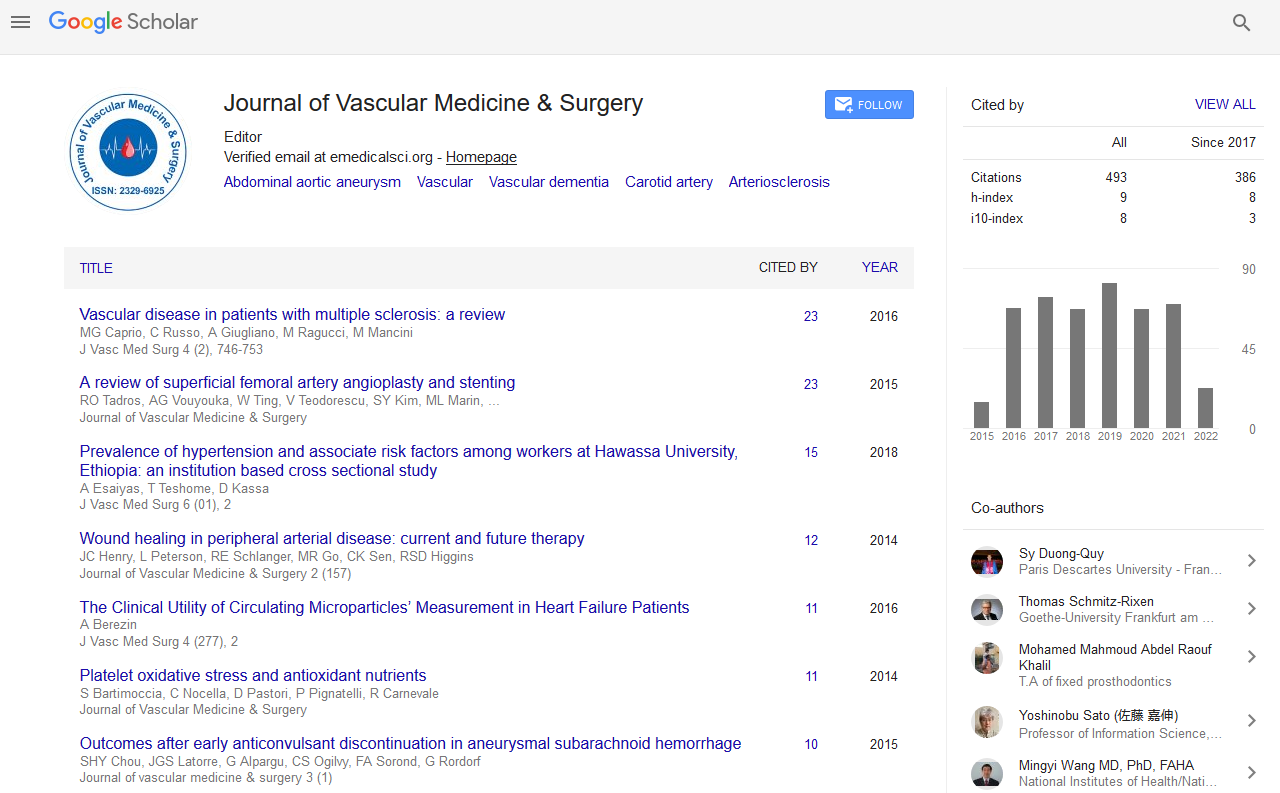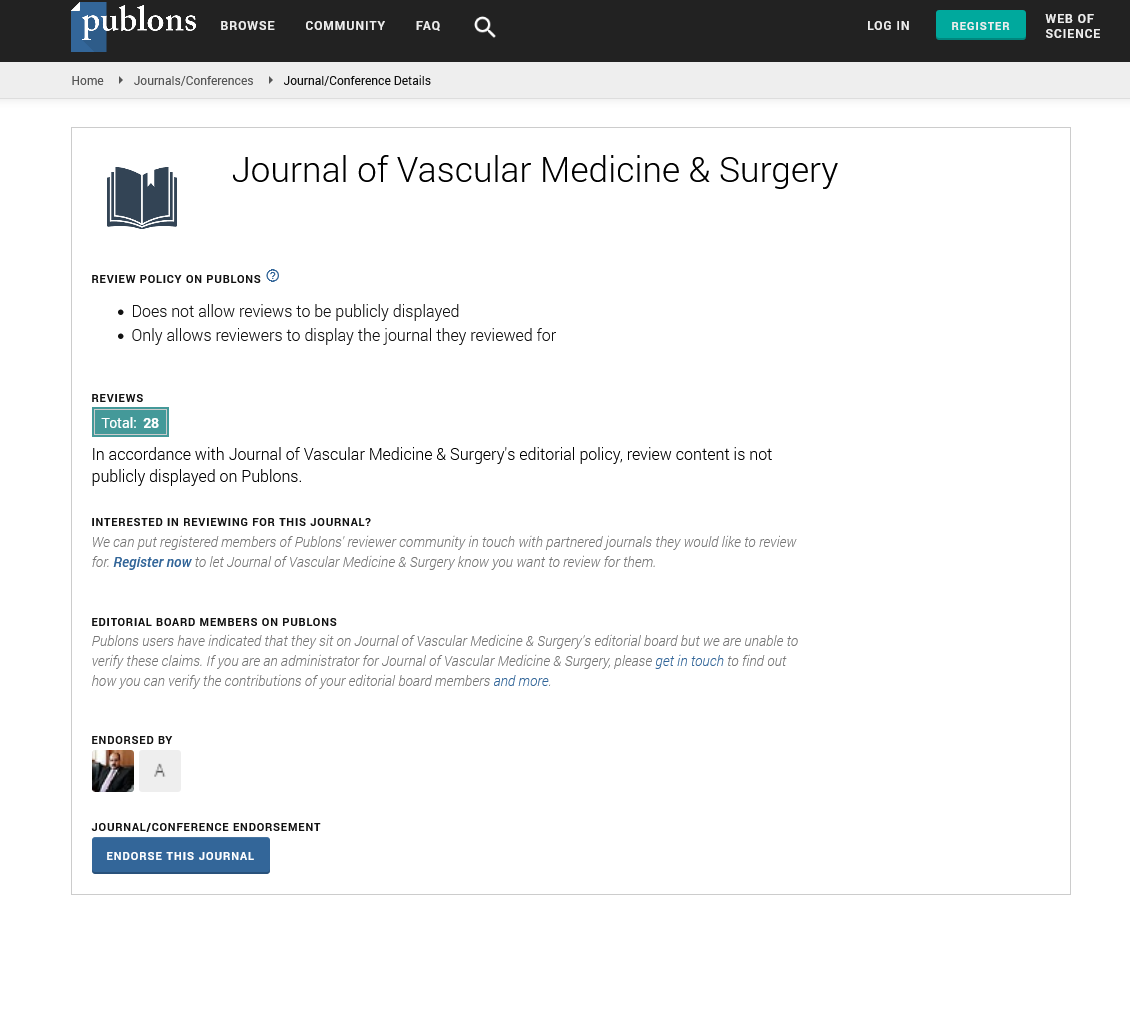Indexed In
- Open J Gate
- Academic Keys
- RefSeek
- Hamdard University
- EBSCO A-Z
- OCLC- WorldCat
- Publons
- Euro Pub
- Google Scholar
Useful Links
Share This Page
Journal Flyer

Open Access Journals
- Agri and Aquaculture
- Biochemistry
- Bioinformatics & Systems Biology
- Business & Management
- Chemistry
- Clinical Sciences
- Engineering
- Food & Nutrition
- General Science
- Genetics & Molecular Biology
- Immunology & Microbiology
- Medical Sciences
- Neuroscience & Psychology
- Nursing & Health Care
- Pharmaceutical Sciences
Hybrid revascularization procedures for critical limb ischemia patients
World Congress on Vascular Diseases, Medicine & Surgeons Summit
October 24-25, 2016 Chicago, USA
Martin Maresch and Dhafer Kamal
Bahrain Defense Forces Hospital, Bahrain
Scientific Tracks Abstracts: Vasc Med Surg
Abstract:
Introduction: Incidence and prevalence of critical limb ischemia (CLI) is rising according the statistics. Conservative treatment leads to amputation for majority of cases with grave impact for the patients, their families and whole society. Early revascularization is the best option for treatment. CLI patients are usually elderly very high-risk patients with high morbidity and poor prognosis. Hybrid revascularization procedures combine advantages of both open and endovascular techniques providing multilevel �??full�?? revascularization with no delay. Since minimally invasive, they provide optimal treatment for the patients with multilevel AS disease. Aim: To study the hybrid revascularization procedures for critical limb ischemia patients. Methods: We refer about 52 cases of CLI patients treated in our institution in 2013-2016 by hybrid approach. Dissection of femoral bifurcation was essential in all the cases. We have combined femoral reconstruction (endarterectomy or fem-pop bypass) with either inflow iliac angioplasty/stenting or run-off BTK endovascular reconstruction. Results: All procedures were technically successful. There was no in-hospital mortality, 7 patients developed transient acute renal impairment with elevation of their creatinine, 2 patients bled after the procedure due to continues i.v. heparin, and one of them needed revision and evacuation of the hematoma. Four patients needed prolonged debridements and dressings due to superficial wound infection, 1 patient got in to the sepsis and required high amputation with patent reconstruction. We comment on short/mid-term patency and very effective limb salvage with the perspective and prospect of combining open and endovascular techniques for limbs salvage. Conclusion: Hybrid revascularization procedures combine advantages of both open and endovascular techniques providing multilevel �??full�?? revascularization with no delay. Since minimally invasive they provide optimal treatment for the patients suffering from multilevel AS disease with very good short/mid-term patency and limb salvage.
Biography :
Martin Maresch is a Vascular and Endovascular Surgeon with 20 years of experience in the field of Vascular Disorders. He has completed his PhD in Medical Science from Comenius University, Bratislava, Slovak Republic. He completed his training in Slovak Repablic, Italy and UK. He is Senior Consultant in BDF Hospital in Bahrain and a Senior Lecturer in Arab Gulf University. He has published numerous papers in reputed journals and has participated as Board Member or Presenter in over 50 international meetings and congresses.
Email: matomar11@yahoo.com


